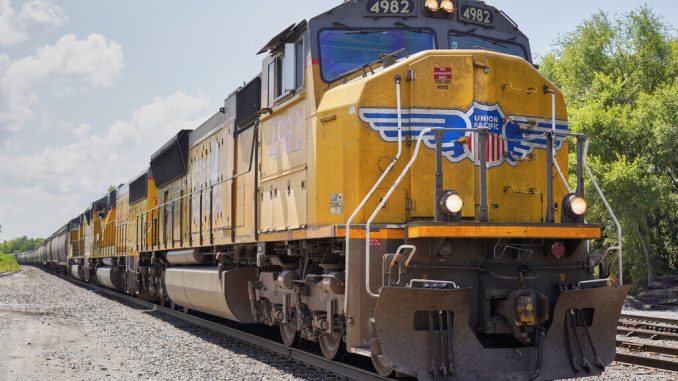
OMAHA, Neb. — Union Pacific’s second-quarter profit fell 28% from a year ago as carload revenue tumbled in the coronavirus pandemic.
The railroad expects improvement in the second half with full-year carload volumes to be down around 10% compared with 2019, assuming there isn’t a second wave of virus-related economic shutdowns.
CEO Lance Fritz said he expects freight volumes to be down 9% to 10% in the second half as businesses recover. “We’re growing our optimism here in the near term,” he said.
Union Pacific made $1.13 billion from April through June, or $1.67 per share, beating Wall Street estimates. Analysts polled by FactSet expected earnings of $1.56 per share. Revenue of $4.24 billion was down 24% for the period, slightly below Wall Street projections.
In the second quarter big freight users such as automakers were forced to close their factories for weeks in an effort to slow the spread of the virus.
As a result, Union Pacific’s freight revenue fell as pricing gains were offset by lower volumes and decreased revenue from fuel surcharges, the company said in a prepared statement.
“Our ability to be nimble and flexible in adjusting our resources to rapidly changing volumes, while providing a high-level service product demonstrates the strength of our service model,” Fritz said.
Shares of the Omaha, Nebraska, company slipped 2% to $175.72 in morning trading.
The number of rail cars generating revenue tumbled 20%, led by a 64% drop-off in the auto sector. Coal fell 24%, while industrial chemicals and plastics were down 10%. Metals and minerals were off 19%. Empty cars transported by the railroad don’t generate revenue.
But company executives said on a conference call that freight volume has been increasing over the last month or so, and the railroad is recalling employees. However, due to productivity gains that include running fewer trains that are longer, it’s taking fewer employees to do the same work.
The railroad won’t be hiring as many people as the economy recovers, said Jim Vena, chief operating officer. “I think we can be more productive in the entire company,” he said. “As the business comes back we’re going to have less people to operate the railroad.”
Union Pacific operates 32,400 miles of track in 23 Western states.
